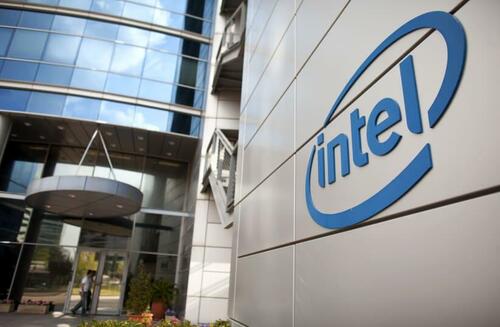The US-based chip giant Intel Corp is halting a $25 billion chip manufacturing project in Israel, the local publication Calcalist reported this week.
The Israeli news agency writes that Intel’s decision to stop the building of the multibillion-dollar factory after "Intel's suppliers received in recent days notice of the cancellation of contracts for the supply of equipment and materials required for the establishment of the company's new factory."

The plant was announced in December of last year and was expected to be built in Kiryat Gat, just shy of 60 kilometers from Tel Aviv.
The Calcalist report states Intel said in response that Israel continues to be one of the technology company’s "key global manufacturing and [research and development] sites, and we remain committed to the region."
"As mentioned previously, the scope and rate of expansion of Intel's production at the company's sites around the world depend on a number of changing factors," Intel’s response read. "Managing a project of this magnitude, especially in our industry, usually involves schedule adjustments. Our decisions are based on business conditions, market dynamics, and responsible capital management."
Since the beginning of the war in October of last year, Israel has suffered economic consequences at the hands of Palestinian groups.
Venture capitalist investments in Israel peaked in 2021 at $29 billion, but as of 2024, foreign investment has sunk to around $5 billion. Chief of Israel’s central bank, Amir Yaron, said in May that Israel’s current war costs $70 billion of the Israeli 2025 budget.
"There is no doubt that more expenses will be needed since the economy needs security, and security needs the economy. However, it is important to emphasize – you cannot give an open check on the issue of security spending, you must find the right balance between things," Yaron said.
Foreign investment by way of defense contracts has been slashed due to Israel’s actions in Gaza.
Earlier this year, Samsung Next decided to close its operations in Israel and focus on other projects abroad. The innovation branch of Samsung has over 70 investments in Israel. In February, The Japanese Itochu corporation’s aviation unit cut strategic contracts signed with Israel’s Elbit Systems Ltd.
Also in February, Belgium’s Walloon Region suspended two ammunition export licenses to Israel following pressure from rights groups. Later that same month, The Netherlands decided to halt deliveries of F-35 fighter jet parts to Israel, citing the same reasons.
The US-based chip giant Intel Corp is halting a $25 billion chip manufacturing project in Israel, the local publication Calcalist reported this week.
The Israeli news agency writes that Intel’s decision to stop the building of the multibillion-dollar factory after "Intel's suppliers received in recent days notice of the cancellation of contracts for the supply of equipment and materials required for the establishment of the company's new factory."

The plant was announced in December of last year and was expected to be built in Kiryat Gat, just shy of 60 kilometers from Tel Aviv.
The Calcalist report states Intel said in response that Israel continues to be one of the technology company’s "key global manufacturing and [research and development] sites, and we remain committed to the region."
"As mentioned previously, the scope and rate of expansion of Intel's production at the company's sites around the world depend on a number of changing factors," Intel’s response read. "Managing a project of this magnitude, especially in our industry, usually involves schedule adjustments. Our decisions are based on business conditions, market dynamics, and responsible capital management."
Since the beginning of the war in October of last year, Israel has suffered economic consequences at the hands of Palestinian groups.
Venture capitalist investments in Israel peaked in 2021 at $29 billion, but as of 2024, foreign investment has sunk to around $5 billion. Chief of Israel’s central bank, Amir Yaron, said in May that Israel’s current war costs $70 billion of the Israeli 2025 budget.
"There is no doubt that more expenses will be needed since the economy needs security, and security needs the economy. However, it is important to emphasize – you cannot give an open check on the issue of security spending, you must find the right balance between things," Yaron said.
Foreign investment by way of defense contracts has been slashed due to Israel’s actions in Gaza.
Earlier this year, Samsung Next decided to close its operations in Israel and focus on other projects abroad. The innovation branch of Samsung has over 70 investments in Israel. In February, The Japanese Itochu corporation’s aviation unit cut strategic contracts signed with Israel’s Elbit Systems Ltd.
Also in February, Belgium’s Walloon Region suspended two ammunition export licenses to Israel following pressure from rights groups. Later that same month, The Netherlands decided to halt deliveries of F-35 fighter jet parts to Israel, citing the same reasons.
